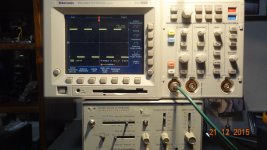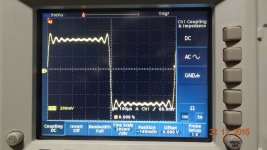I cannot resist:Read the book "On Intelligence" by Jeff Hawkins. It nicely explains the current brain research and even postulates why learning new things changes with experience.
"Experience is a comb that life gives you after you became bald."
Ramblings
Could it be possible that once we are very familiar with the sound of a particular amp, that when we then listen to another, that we subconsciously carry a signature of the familiar and try and find/fill in and extract that same signature from the different amp.
Trippy version of Mariah Carey
Same happens with speakers...... the mind will fill-in the sound as we expect it to be or have previously experienced it to sound. The mind fills it in to make one sound like the other. I notice this on cheap inferior speakers after I have listened to flat, low distortion speakers for a reference. The longer time spent listening to the crappy speakers, the better it sounds.
Question --- when we test an amp with a square wave, we expect to see a square wave at the output port. If we see peaking and /or ringing.... we need to find the cause and eleminate it. Same for speakers with peaked or ringing behaviour. We know how this sounds.... bright... hard... lacking detail and resolving power etc.
So why do we allow it with digital products.... sending thier digital filter artifacts to analog pre/PA which look and sound like ringing added to everything... With digital filters and sq wave signals we can often get HF signal added. This level is like 10-20% of the desired ssignal amplitude. Does it produce IM in some amps? More importantly- that level after amplified by PA to a tweeter and how the tweeter is affected.... IM? Distortions. Over driving. This is a reason to dislike the sound of CD.
Using just 1 volt p-p, I get an analog output to amps and tweeter of .2v at 50usec ripple period or 20Khz.
 This is a 1KHz square wave recorded
This is a 1KHz square wave recorded And, played back on same machine at analog output.

Why do we allow this? We wouldnt if it was an analog instrument/amp.
The added filter LPF (passive LCR) helped reduce this ripple/ringing level.
THx-RNMarsh
Last edited:
And I cannot understand neither the meaning of this actual discussion. No amp is perfect, neither speakers.
Are-you trying to find a perfect amp that don't exists, or the one that gives-you the maximum of pleasure on things that you care much, or the one that will help-you, if you are a sound ingeneer, to make less errors as possible during mixages. ?
You have to choose between the aspects that means the most for you (and they are different for an other), between micro dynamic (details), global dynamic, separation and space between instruments, localisation, sound stage, fatigue... Chose your pions in the order you prefer them. Ans I don't see why some could prefer a new amp closer than the previous to avery different one, the pleasure of the life is in diversity and novelty.
Are-you trying to find a perfect amp that don't exists, or the one that gives-you the maximum of pleasure on things that you care much, or the one that will help-you, if you are a sound ingeneer, to make less errors as possible during mixages. ?
You have to choose between the aspects that means the most for you (and they are different for an other), between micro dynamic (details), global dynamic, separation and space between instruments, localisation, sound stage, fatigue... Chose your pions in the order you prefer them. Ans I don't see why some could prefer a new amp closer than the previous to avery different one, the pleasure of the life is in diversity and novelty.
Richard, I believe (and i believe you know-it) that is is not "ripple/ringing", but just a square wave signal with higher harmonics totally and abruptly removed.The added filter LPF (passive LCR) helped reduce this ripple/ringing.
Same happens with speakers......
I hadn't considered that possibility. One whole new can of

Why do we allow this? We wouldnt if it was an analog instrument/amp.
My guess would be that we allow it simply because the technology to overcome it was/is out of reach. A 1kHz squarewave that is to be recorded and played back 'perfectly' via digital (or analogue) means is a formidable challenge. Vinyl won't do it, tape won't do it, neither will digital this side of mega buck price tags.
Richard, I believe (and i believe you know-it) that is is not "ripple/ringing", but just a square wave signal with higher harmonics totally and abruptly removed.
The 'ripple or ringing' - like- new added signal is described from traditional analog view. It is from the ripple of the sharp cut-off LPF (20KHz) design. Better filters with much lower ripple level beyond cut-off and still not introduce audible group delay is needed. Dont know if that Must cost more.
THx-RNMarsh
Last edited:
One whole new can of
A much more serious issue is where my Popworm has gone. One moment it was there, now its gone...
Vinyl will produce unwanted HF when the cart mistracts.... tape may have HF bias freq on it for amps/tweeters et al to deal with.
Note... tube PA tend to filter all this out with limited BW of OP transformer.
THx-RNMarsh
I've never regarded tape bias as a potential trouble causer, I would have though any artifacts from that would be way down. I imagine your referring to reel to reel and not cassette though. Never had my paws on an R/R to measure.
When we test equipment for distortion, we do it band-limited to 20-30KHz..... then we measure freq response of amps....... we do this individually... in isolation from one another. We pretend there is not a lot of junk the pre/amp do not have to deal with (and speakers). Only S/N. Its all there and the analog gear amplifies it and sends it to our speakers. Its some of the reasons CD have not been liked by some critical listeners. It isnt the one and zeros themselves. That is the raw signal... its like food processing.... artifacts being amplified and sent to speakers and pretending its all OK because of how we measured it.
TH-RNMarsh
TH-RNMarsh
Last edited:
The causes in analog and digital are different. we all know that. The extraneous and undesired artifact, well above the noise floor, is the issue to be addressed... it causes similar end results regardless of how it was produced/developed.
Some who Master use their EQ control to cut-off everything above 15KHz because raw sounds so bad. We need better digital filters at popular prices!
Now I will look at what BenchMark (2) has done. I can run a sq wave thru BenchMark ADC and output in digital thru BenchMark DAC and view in real time what happens.... the rest is in the CD recorder/player system.
THx-RNMarsh
Some who Master use their EQ control to cut-off everything above 15KHz because raw sounds so bad. We need better digital filters at popular prices!
Now I will look at what BenchMark (2) has done. I can run a sq wave thru BenchMark ADC and output in digital thru BenchMark DAC and view in real time what happens.... the rest is in the CD recorder/player system.
THx-RNMarsh
Last edited:
I'm curious... why square waves ? Aren't all musical signals limited by real world physics and microphones ?
Or the simple fact that plus to minus full scale in one sample period could not have been created by a process that obeys Nyquist, it's simply made up by the computer.
It is typical from oversampling and digital filters. A brick wall upon half the sampling frequency.The 'ripple or ringing' - like- new added signal is described from traditional analog view.
You can get the same by pure calculations.
The "ripple" (witch is not) is out of the audio range and this signal a clear demonstration of situations where slew-rate and bandwidth are not correclated any more in some digitaly processed signals. Reason why we want high slew rate amplifiers, with analog HF input filters, limiting the slew rate.
Christophe,
I understand that typically the input filter is a simple RC network to band limit the input to the amplifier. What happens when you use a higher order filter such as a fourth order filter and lower the upperfreq. set point say to 50Khz instead of 100khz, can you do that and still keep a flat input up to the 20khz range or does this introduce other problems I'm not aware of?
I understand that typically the input filter is a simple RC network to band limit the input to the amplifier. What happens when you use a higher order filter such as a fourth order filter and lower the upperfreq. set point say to 50Khz instead of 100khz, can you do that and still keep a flat input up to the 20khz range or does this introduce other problems I'm not aware of?
Or the simple fact that plus to minus full scale in one sample period could not have been created by a process that obeys Nyquist, it's simply made up by the computer.
Sure and the ADC's filter won't let the square wave through if it works properly.
I was more questionning the rationale of even feeding such an artificial signal to an ADC. In papers by Neumann (see lect0036 and 48 on their site), the worst case transients (generated by spark discharges for testing) are pretty fast but still nothing like a square wave.
I just don't get this obsession with square waves testing for digital

Ramblings
Could it be possible that once we are very familiar with the sound of a particular amp, that when we then listen to another, that we subconsciously carry a signature of the familiar and try and find/fill in and extract that same signature from the different amp.
Well I have a prime example of that. After nursing a dying amplifier for the last 10 years finally put in a (new to me) unit. The old one had high hum levels, fairly nasty distortion profiles and generally not much going for it. But it fulfilled a purpose whilst I had more important things going on.
The new is hum free, DC to daylight FR and low distortion. As one might expect the loss of 100Hz and multiples as a constant background subjectively feels like there is suddenly a lot less bass.
By tomorrow I will have forgotten the old...
(ref the old, I've been a bit busy the last few years).
Gibbs PhenomenonSo why do we allow it with digital products.... sending thier digital filter artifacts to analog pre/PA which look and sound like ringing added to everything...
Quality Lies in the Details Page 3 | Stereophile.com
The squarewave response doesn't give much clue to sound quality, but it does reveal what aspects of overall performance the designer thought most important.—John Atkinson
- Status
- Not open for further replies.
- Home
- Member Areas
- The Lounge
- John Curl's Blowtorch preamplifier part II